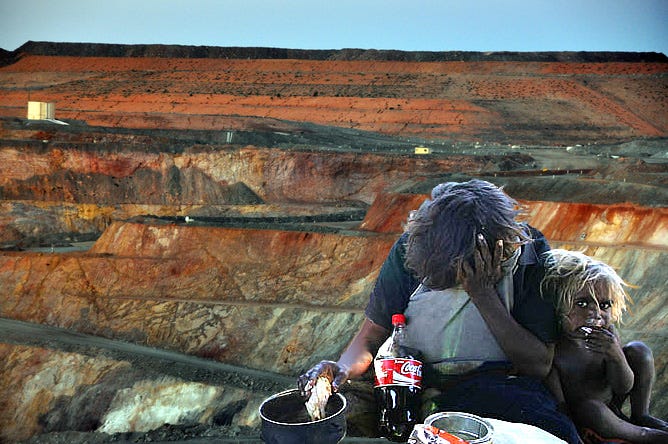In March, ASIO’s Director-General, Mike Burgess gave his annual assessment of Australia’s national security threats.
His assessment was of a war being waged by foreign agents, as well as elements from within.
The assessment drew criticism claiming it was over exaggerated and there wasn’t the crisis Burgess was suggesting.
However, Burgess is right, and the ‘Voice to Parliament’ appears to be the biggest unnoticed threat to Australia’s security.
The ‘Voice’, for all its perceived good, is considered by community leaders to be another way to manipulate Indigenous, and all Australians, through an increased opportunity for foreign interests to exploit the resources sector and again benefit from the sacrifice Indigenous Australians have endured.
A growing number of Indigenous Australians believe they are sold out by the Federal Government and self-appointed Indigenous leadership.
Is The Voice selling out Indigenous Australians and serving a political master that’s a foreign power?
The hidden hand of Chinese hegemony could be rocking Australia’s cradle, and the Albanese Government and some Indigenous leaders are prepared to sacrifice Australia for what it could secretly deliver to ‘them.’
Mining interests, profits, a grab for land, and Australia’s sovereignty are all for sale in this carefully executed strategy.
China remains an overwhelming source of danger to Australia’s national security.
If the knowing sell-out of Australia’s sovereignty and Indigenous Australians to greater powers as alleged by many Indigenous Australians is true, then the ride is about to get bumpy, and Australians should hang on.
One Indigenous Australian expressing concern is academic and former Liberal Party campaigner, Reuben Humphries.
Humphries is a Wiradjuri man with ancestral ties near Narrandera in New South Wales, now living in Victoria.
He believes the ‘Voice’ could be the gateway for foreign powers to affect a greater stake in Australia using Indigenous Australians as the means.
The ‘INDIGENOUS VOICE Discussion Paper’ report, is a document Albanese and its authors, Marcia Langton, and Tom Calma, believe heralds a new pathway for Indigenous Australians.
But the Report appears flawed, and Humphries citing it says, “The legislation is concerned about the risk of low voter turnout in its regular elections for candidates to the ‘Voice’ and permits Canberra to make undemocratic appointments at whim with only a concern of low voter turnout in non-compulsory elections as a justification for having no election and only appointing candidates acceptable to whoever is in government.”
Humphries also fears legacy candidates “appointed” by an outgoing government will be a veto over legislation and the democratic process of next elected government.
“If the ‘Voice’ gets up,” Humphries says, “it casts a shadow of manipulation and control by the government and foreign influence in Indigenous issues and mining rights Burgess can already see over our federal leadership.”
“These documents don’t state the obvious, but the politically experienced can see the top-down controlled process that will disadvantage indigenous communities and all Australians alike for the benefit of a privileged few.”
Australians like Humphries understand the Federal Government’s intent.
“The Fed’s will decide who is or isn’t Indigenous, where before, it was Indigenous Australians who decided their own identity.
“Albanese will step in and make that decision now and you may be happy. But what happens when there’s a change in government. What will their definition be and how will they decide who is Indigenous?”
On reading of the Langton/Calma report, it will be the Parliament and the bureaucracy who Indigenous Australians will be forced to obey, begging the question, what do bureaucrats know about being Indigenous and how would they determine what and who is Indigenous?
Humphries says local Indigenous communities are already infiltrated by special interest groups – “from environmental pressure groups engaging in ‘lawfare’ to the extractive (mining and fossil fuel) industries themselves.”
“These special interest groups, already adept at influencing Native Title claims, would be able to influence the regional selection of representatives and front, in person, as industry appointed advisors who the Voice must consult as stated in the reports explaining how the Voice will work.”
If Humphries is right, the Voice will be captured by special interests, corruption and influence from day one, with the extractive industries and foreign shareholders keeping costs and taxes low by cutting renumeration to those communities and ensuring freehold or radical title land ownership will never be allowed - avoiding paying a fair market rate for mineral wealth that should be in Australian private ownership, something that would benefit the whole Australian economy.
“All Australian’s are losing by keeping massive tracts of Australia out of any kind of private ownership as Native Title holders have been learning.”
“This is the core of foreign interests, especially the CCP as our biggest buyer. Remember the Mining Resources Rent Tax? That’s why we went through ‘Rudd, Gillard, Rudd’. None of the proposal for the ‘Voice’ would be developed without first discreetly consulting and winning support of the Extractive industries,” he says.
If this approach becomes a filter installing political allies and ousting political opposition, it will be a corrupt process according to Humphries, “where the influence of money and political donations will determine mining leases and allow for foreign interests to extend and expand their influence.”
“Now we can see the power of a federal government already subject to foreign influence providing greater incentive to foreign powers to manipulate Australia and compromise decisions that’ll benefit or harm Indigenous communities and Australians alike.”
Australian and Aboriginal sovereignty alike is being sold for a peppercorn under a banner of more voices and less listening.
Australia may no longer be able to defend if it doesn’t act to address Burgess’s warnings about a corrupt political class.




